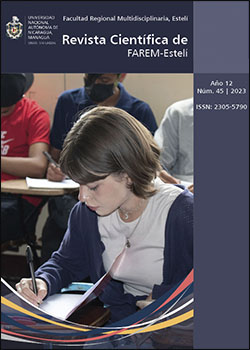Analysis of soft skills in Business Administration, Marketing and Advertising careers. Universidad Católica Redemptoris Mater en Managua, Nicaragua
DOI:
https://doi.org/10.5377/farem.v12i45.16035Keywords:
Competencies, soft skills, job performance, professional trainingAbstract
Currently, Higher Education Institutions have a fundamental challenge, which consists of developing soft competencies in an integral way to achieve professional success in the graduates of Business Administration and Marketing and Advertising careers of the Universidad Católica Redemptoris Mater in Managua, Nicaragua. The vertiginous transformations that arise in organizations demand a complete training where the need is detected for employees to possess skills such as: critical and analytical thinking, to manage their time effectively, to have the ability to accept new learning where they can make decisions to solve situations with the stored knowledge. The objective of this study has been to identify the soft skills most in demand in the careers of Business Administration and Marketing and Advertising, as well as the analysis of university training in the curricula and the main competencies required in the labor market. The present research was carried out quantitatively and the analysis was performed with the use of statistical techniques and tools. Likewise, the research design was carried out with a transversal cut, since the study variables were not manipulated. The results of this research indicate that there is currently no significant difference between the level of soft skills required by the companies and the level demonstrated by the students. It is expected that the results obtained from this research will contribute in a positive way to raise the awareness of the authorities to change and evolve the role of education from the traditional way to a new role where the formation of competencies is considered in the new curricula in an active and dynamic way, and allow the graduates to perform in their work in an effective and successful way in the organizations.
Downloads
References
Álvarez Cedillo, J. A., Aguilar Fernández, M., Álvarez Sánchez, T., García Jarquín, B., & Patiño Ortiz, J. (2020). La gestión del conocimiento en instituciones educativas. RIDE. Revista Iberoamericana para la Investigación y el Desarrollo Educativo, 11(21). La gestión del conocimiento en instituciones educativas (scielo.org.mx)
Bitar, S. (2020). El futuro del trabajo en América Latina. Cómo impactará la digitalización y qué hacer. Diálogo Interamericano. EL-FUTURO-DEL-TRABAJO-EN-AMERICA-LATINA-FEBR-2020.pdf (udd.cl)
Banco Interamericano de Desarrollo, BID 2017, La importancia de las habilidades blandas para las PYMes: https://conexionintal.iadb.org/2017/09/01/la-importancia-de-las-habilidades-blandas-en-las-pymes/#:~:text=En%20cambio%2C%20las%20habilidades%20blandas,del%20personal%20en%20una%20empresa
Barreto Carrion, J. P., & Izquierdo Henriquez, C. A. (2017). La importancia del coac ing en el desarrollo de las habilidades blandas del personal de la empresa MARCIMEX en la ciudad de trujillo año 2016. Tesis de grado de la Universidad Privada Antenor Orrego, Perú. RE_ADMI_JHON.BARRETO_CESAR.IZQUIERDO_IMPORTAQNCIA.DEL.COACHING_DATOS.PDF (upao.edu.pe)
Buxarrais Estrada, M. R. (2013). Nuevos valores para una nueva sociedad. Un cambio de paradigma en educación. Edetania, (43), 53-65. 215-Texto del artículo-577-1-10-20171122.pdf (ucv.es)
Chiavenato, I. (2018). Introducción a la teoría general de la administración. México, D. F: McGraw-Hill Interamericana.
Escámez-Sánchez, J., & Peris-Cancio, J. A. (2021). La universidad del siglo XXI y la sostenibilidad social. Tirant humanidades.
Gómez-Gamero, M. E. (2019). Las habilidades blandas competencias para el nuevo milenio. Divulgare Boletín Científico de la Escuela Superior de Actopan, 6(11).
Gómez, P. J. R., & Gómez, J. A. R. (2022). Retos para la gestión de la universidad actual. Pro Sciences: Revista de Producción, Ciencias e Investigación, 6(42), 137-145.
Hill, C. Jones, G., Pérez, Y., Soto, G., & Martínez, N. (2009). Administración estratégica (No. Sirsi) i9789701072691). México: McGraw-Hill.
Millalén, F. V. (2017). Infusión de habilidades blandas en el currículo de la educación superior: Clave para el desarrollo de capital humano avanzado. Revista Akadèmeia, 15(1), 53-73. 129 (ugm.cl)
Mina, M. A. E., & Barzola, D. G. (2020). Habilidades blandas en la educación y la empresa: Mapeo Sistemático. Revista Científica UISRAEL, 7(2), 39-56.
Núñez Lira, L. A., Bravo Rojas, L. M., Cruz Carbajal, C. T., & Hinostroza Sotelo, M. D. C. (2018). Competencias gerenciales y competencias profesionales en la gestión presupuestaria.
Schnarch, A. (2020). Creatividad e innovación. Alpha Editorial.
Ramírez Villena, A. (2022). Liderazgo directivo y toma de decisiones en la Institución Educativa Alejandro Velasco Astete, distrito de San Jerónimo, provincia de Cusco año 2019. Tesis de maestría de la Universidad Nacional de San Antonio Abad del Cusco, Perú. untitled (unsaac.edu.pe)Ruiz de Vargas, M., Jaraba Barrios, B., & Romero Santiago, L. (2005). Competencias laborales y la formación universitaria. Psicología desde el Caribe, (16), 64-91. Competencias laborales y la formación universitaria - ProQuest
Ortega, C. (2017). Desarrollo de habilidades blandas desde edades tempranas. Centro de Publicaciones, Universidad ECOTEC. 42-1 (ecotec.edu.ec)
Vargas, F., & Carzoglio, L. (2017). La brecha de habilidades para el trabajo en América Latina: Revisión y análisis en la región.
Vásquez Nassi, G. E. (2022). Competencias laborales y empleabilidad de estudiantes en administración–UNAC. http://hdl.handle.net/20.500.12952/6208
Published
Issue
Section
License
Copyright (c) 2023 Revista Científica de FAREM-Esteli

This work is licensed under a Creative Commons Attribution-NonCommercial-ShareAlike 4.0 International License.



